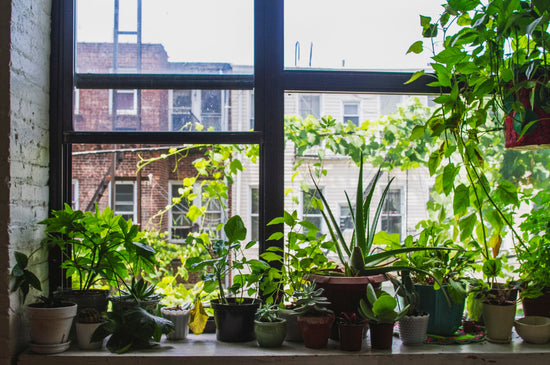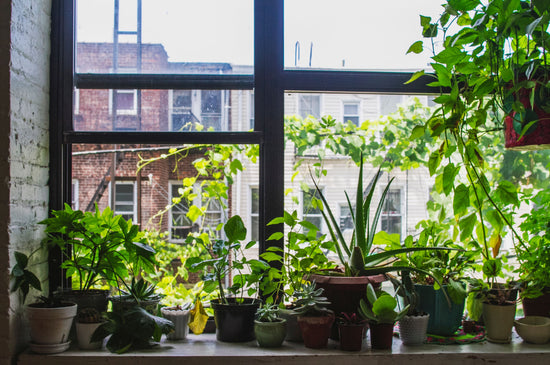Making Tap Water Safe for Your Plants
Providing your houseplants with safe water is essential to their health and growth. Tap water can contain chemicals like chlorine and fluoride or minerals like calcium and magnesium, which can negatively affect sensitive plants over time. Leaf tip burn, yellowing leaves, and mineral buildup are common signs that your plants may be reacting to tap water. Here’s how to make your tap water safe and keep your plants thriving.
Why Tap Water Can Be Harmful to Plants
Many municipal water sources contain additives to make water safe for drinking but may not be ideal for houseplants. Chlorine and fluoride, along with hard minerals like calcium, can build up in the soil and potentially cause damage to sensitive plants, especially over time. Plants like Peace Lily, Dracaena, and Spider Plant are particularly vulnerable to these substances and may show signs of distress, such as brown leaf tips or stunted growth.
Signs That Tap Water Is Affecting Your Plants
If you notice browning or yellowing leaves, dry or crispy leaf edges, or a white crust on the surface of the soil, your plants may be sensitive to the chemicals or minerals in tap water. Commonly affected plants include the Boston Fern, Rubber Plant, and African Violet, which often show visible signs of stress from poor water quality.
Simple Methods to Make Tap Water Safe
-
Letting Water Sit
One of the easiest methods to make tap water safer for plants is to let it sit out for 24 hours. During this time, chlorine can evaporate, reducing the potential for leaf damage. Place the water in an open container and allow it to sit at room temperature before using it on your plants. -
Boiling Water
Boiling can remove some of the dissolved minerals in hard water and make it safer for plants. After boiling, let the water cool to room temperature. Boiling is especially beneficial for plants sensitive to hard minerals, like the Peace Lily and Dracaena. -
Using Filtered Water
Filtering tap water is another effective way to remove chemicals and minerals. Filtered water can be used on all plants but is especially helpful for more delicate varieties like Philodendron and Pothos. A basic water filter pitcher or an under-sink filter can reduce or eliminate many of the harmful additives in tap water. -
Distilled Water
Distilled water is free from minerals and chemicals, making it one of the safest options for watering sensitive plants. While it’s not necessary for every houseplant, distilled water can be beneficial for those that show signs of distress from tap water. Consider using it for plants like Spider Plant and African Violet.
Alternative Water Sources for Houseplants
-
Rainwater: Naturally soft and free of chemicals, rainwater is ideal for most houseplants. Collecting rainwater can be a cost-effective solution and works well for a wide range of indoor plants, including tropical varieties like the Fiddle Leaf Fig and Bamboo Palm.
-
Aquarium Water: If you have a freshwater aquarium, the used water can be a great source of nutrients for houseplants. Just be cautious if the aquarium water contains salt or other additives.
-
Purified or Bottled Water: Purified water or bottled water can be a good alternative if you’re caring for particularly delicate or valuable plants. However, it’s generally not necessary for most houseplants.
Tips for Watering Different Types of Houseplants
Each type of plant may react differently to water quality, so it’s essential to tailor your approach based on your specific plants. Here’s how some popular houseplants respond to different water types:
- Soft Water Needs: Plants like Philodendron, Pothos, and ZZ Plant do well with soft water and benefit from low levels of minerals and chemicals.
- Tolerant to Hard Water: Succulents and cacti can tolerate higher mineral levels but still prefer chlorine-free water. Using a filtration method can help, especially for large potted plants or mixed containers.
Maintaining Soil Health to Minimize Water Effects
To further protect plants from mineral buildup and chemical residues, practice regular soil maintenance:
- Flushing the Soil: Every few months, pour a large amount of water through the soil and allow it to drain completely. This will help wash away any accumulated salts or minerals.
- Well-Draining Soil: Using a well-draining soil mix, especially in indoor plant pots with drainage holes, can reduce the risk of mineral buildup. Repotting plants like Peace Lily and Spider Plant every 1-2 years also helps keep the soil fresh.
Creating a Watering Routine for Healthier Plants
Consistency is key when it comes to watering plants with safe water. A regular watering schedule helps prevent issues like root rot from overwatering and dehydration from underwatering. Adjust your watering routine based on the plant’s needs, the season, and the environmental conditions in your home.
Frequently Asked Questions
-
How long should I let tap water sit before using it?
Letting tap water sit for 24 hours allows chlorine to evaporate, making it safer for most plants. -
Can I use filtered water for all my plants?
Yes, filtered water is generally safe for all plants, especially those sensitive to chemicals in tap water. -
Is rainwater safe for indoor plants?
Rainwater is naturally soft and chemical-free, making it an excellent choice for most houseplants. -
What plants are sensitive to tap water?
Plants like Peace Lily, Dracaena, and African Violet are more sensitive to chemicals in tap water. -
Can I use boiled water for plants?
Yes, boiling water removes chlorine and reduces hardness, making it safer for sensitive plants. -
Does distilled water help prevent leaf burn?
Distilled water has no minerals, which can help prevent leaf burn in sensitive plants. -
How often should I flush the soil to remove minerals?
Flushing soil every few months can help prevent mineral buildup, especially for potted indoor plants. -
Is aquarium water good for plants?
Freshwater aquarium water contains nutrients and can benefit most houseplants, but avoid using saltwater.
Final Thoughts on Making Tap Water Safe for Plants
Ensuring your plants have access to safe, chemical-free water can make a significant difference in their health and longevity. While some plants are more tolerant, sensitive varieties like Peace Lily, Fiddle Leaf Fig, and Spider Plant may benefit from filtered or distilled water. Implementing small changes in how you prepare and provide water for your plants will promote a greener, healthier indoor garden. Give your plants the hydration they deserve, and watch as they flourish in their safe, nourishing environment.





